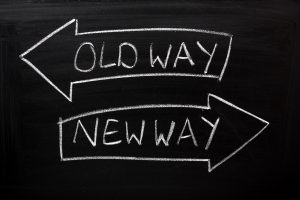 We’re all now getting used to rapid change, whether we like it or not. We are constantly reacting to the conditions around us, and at times it is valuable to find order and instill control. But sometimes, it is essential to move with the chaos to grow. Like everything in the natural world, we go through cycles. This moment seems to be a cycle of change to account for loss and prepare for growth.
We’re all now getting used to rapid change, whether we like it or not. We are constantly reacting to the conditions around us, and at times it is valuable to find order and instill control. But sometimes, it is essential to move with the chaos to grow. Like everything in the natural world, we go through cycles. This moment seems to be a cycle of change to account for loss and prepare for growth.
So how do we define normal on the edge of societal change?
Before we get into that, it must be acknowledged – you have been working against unprecedented hardships and you are not alone. Just for a moment, close your eyes and thank yourself for the resilience you’ve already cultivated.
The truth is, there is no one normal, and in the act of defining normal for culture at large, growth becomes trapped in time. What is normal is change.
Learning how to wade through the currents of change is an essential tool for individual and organizational growth. Navigating change is not easy; it has never been! We have a program called “Resilience in the Face of Chaos“, and it was launched well before Covid-times as part of our Burnout Prevention series. When things change, we can choose to resist or choose to adapt. It is essential to notice if you’re fighting change, you might be saving yourself and your colleagues a big headache by reflecting on this. Read our past blog, “5 Signs you are resisting change“, to learn more about the signals of opposing changes.
However, many changes are on a scale that is out of our control. We can put in the effort to make new habits for personal growth, but we can’t stop the change from happening.
Like a ballerina, orient yourself to something stable. When a figure skater or ballerina spins around, their training instructs them to find a fixed point. They reconnect with that point again and again as they turn. What is a point of stability in your day? In your week? And in your month? As elements in your personal and professional life shift, what can you return to as a way to reorient?
Acknowledge that you can adapt. Humans have been subtly adapting for years. A ballerina spins without getting dizzy: not just from spotting but also from training their brain from years of practice.
In urgent times, it is vital to slow down. A dancer doesn’t train their body and brain in a day. Adapting takes time and requires a dedication to honoring the skills necessary to welcome long-lasting change. Dr. Bayo Akomolafe argues for slowing down as an essential reaction to the multiple crises we collectively face.
Cultivate the conditions for a new and necessary paradigm shift to emerge, one that aims to heal and regenerate planetary and human resources. The old paradigm, an extractive mentality of growth at the expense of health, is our collective lesson to unlearn.
The symptoms are all around us. Moral fatigue and burnout are all too familiar; these kinds of stressors indicate that change is needed. A Gallup poll published that the end of 2020 defined new lows in mental health, and we already know how important mental wellbeing is towards productivity.
There is no doubt that people (and this planet that sustains us) are suffering. Climate disasters are commonplace in the news, youth movements are demanding change, and we ask old structures to adapt. If we zoom out and see our timeline of humanity, perhaps we are in an adolescence phase. Maybe this growth discomfort is towards a maturity into adulthood where we can practice personal responsibility and prioritize communal needs.
Change opens the doors for new possibilities, so what opportunities will you cultivate in this new normal?
If you need help finding a fixed point, DCC and Courageous Hearts have partnered up with “Building Resilience,” a program to help you create your personalized Resilience Toolkit.
